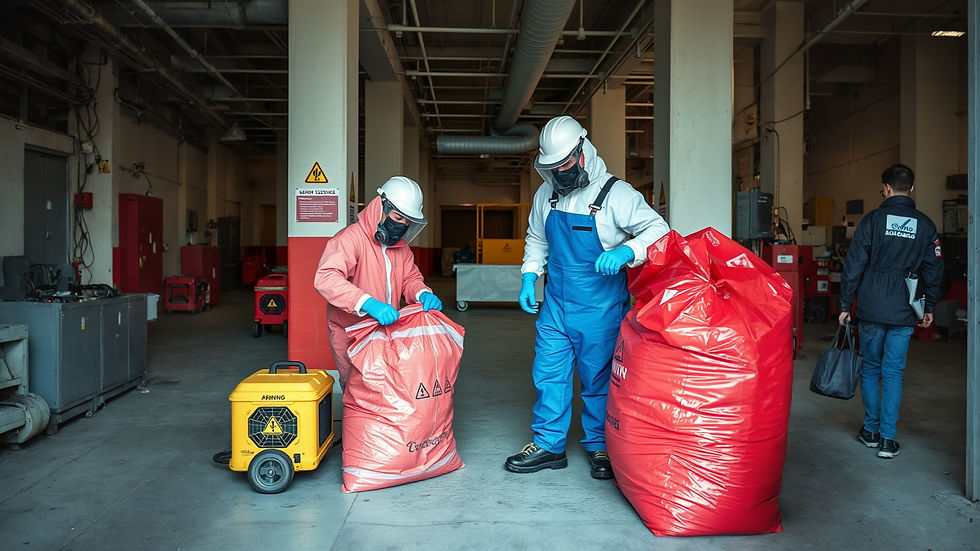Asbestos Collection and Disposal: How a Professional Service Keeps You Safe and Compliant
- John Mayers
- Jun 25
- 3 min read
Why Proper Asbestos Handling Matters
Asbestos, once hailed for its insulation and fire-resistant properties, is now widely recognised as a dangerous material. When disturbed, asbestos-containing materials (ACMs) release microscopic fibres into the air. Inhalation of these fibres can lead to severe health conditions such as mesothelioma, asbestosis, and lung cancer. That’s why asbestos collection, removal, and disposal must be handled professionally and in strict accordance with UK regulations.
Ignoring or mishandling asbestos isn’t just a health risk — it’s a legal one. Property owners, landlords, and contractors all carry a legal responsibility under the Control of Asbestos Regulations 2012 to ensure that asbestos is properly managed and removed by licensed professionals.
What Is Involved in Asbestos Collection?
Asbestos collection is the first stage of a controlled process that involves identifying, isolating, and safely extracting asbestos-containing materials from a property. This process should only be performed by trained specialists who are equipped with the proper safety gear and follow strict procedures to avoid fibre contamination.
A professional collection team will:
Survey the property to locate ACMs
Seal off affected areas to prevent airborne fibre release
Use H-type vacuums and protective suits during extraction
Package asbestos waste using double-wrapped, clearly labelled UN-approved bags
This level of precision ensures that no harmful particles escape into the surrounding environment during the process.
Why DIY Is Not an Option
Attempting to collect or remove asbestos without professional support is extremely dangerous. Even minor disturbances can release thousands of invisible fibres, and household dust masks are no match for airborne asbestos.
Furthermore, improper asbestos collection is illegal. Only licensed carriers can legally remove asbestos waste from a site. Violating these laws can result in large fines or even prosecution.
Safe and Legal Asbestos Removal
Once collection is complete, the next step is secure asbestos removal. This involves the transport of hazardous material to an approved disposal facility. Licensed asbestos removal teams follow stringent protocols to ensure zero exposure during transit.
Key elements of professional asbestos removal include:
Accurate waste tracking with documentation
Approved vehicle transport with sealed containment
Secure delivery to licensed waste treatment centres
Full compliance with hazardous waste disposal laws
This seamless process ensures the safety of all parties involved, while protecting the environment from potential contamination.

What Makes Professional Asbestos Disposal Different?
Professional asbestos disposal goes beyond just getting rid of waste — it’s about protecting public health and staying compliant with environmental regulations. Asbestos waste must be disposed of at designated hazardous waste sites, where it's carefully handled, contained, and permanently sealed off.
A registered disposal partner will:
Maintain accurate disposal records
Issue waste consignment notes for legal traceability
Use eco-responsible methods aligned with UK waste management standards
Improper disposal — like dumping asbestos in a general waste bin or skip — not only endangers others but carries serious legal consequences.
Legal Compliance: What You Need to Know
Here are the essential legal requirements around asbestos collection and disposal:
Duty to Manage: If you’re responsible for a property, you must assess and manage any risk from asbestos.
Licensed Contractors: Only HSE-licensed contractors are allowed to handle high-risk asbestos work.
Waste Consignment Notes: These must be kept for at least three years as proof of lawful disposal.
Notification: Some removal work must be reported to the HSE at least 14 days before starting.
Failing to meet these requirements can lead to large penalties and long-term consequences.
Signs You Need a Professional Service
If you notice any of the following, it’s time to call in professionals for asbestos collection and disposal:
Deteriorating insulation, pipe lagging, or textured coatings
Damaged ceiling tiles or floorboards in older properties
Renovation or demolition of structures built before 2000
No previous asbestos survey on record
When in doubt, don’t guess — test. A qualified surveyor can confirm the presence of asbestos and guide you through the safest way forward.
Benefits of Using a Licensed Asbestos Collection Service
Health Protection: Eliminates the risk of airborne fibre exposure
Legal Peace of Mind: Keeps you fully compliant with all UK asbestos regulations
Safe Environment: Ensures occupants and workers are protected
Efficient Process: From identification to disposal, it’s handled with expertise
Documented Assurance: Full reporting and paperwork to prove lawful disposal
Final Thoughts
Dealing with asbestos isn’t just about ticking a compliance box — it’s about ensuring the health and safety of everyone who enters your property. Whether you're planning renovation, managing a commercial building, or just want peace of mind, a professional asbestos collection, removal, and disposal service is essential.
By choosing licensed specialists, you’re not only safeguarding lives — you're protecting your property, your reputation, and your future.



Comments